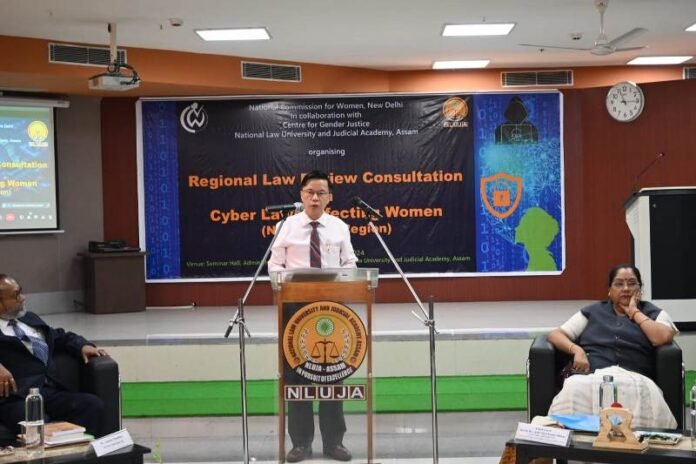In a major step towards enhancing legal frameworks around digital safety and cyber laws, the National Commission for Women (NCW) in collaboration with the National Law University and Judicial Academy, Assam (NLUJA), hosted a Regional Law Review Consultation on Cyber Laws. This event, held in Assam, brought together legal experts, academicians, policymakers, and representatives from various sectors to discuss pressing issues related to cyber laws, particularly those impacting women and marginalized communities.
Context of the Consultation
With the rapid advancement of technology and the increasing dependence on digital platforms, the relevance of robust cyber laws has never been more critical. Cybercrime has surged in recent years, encompassing various offenses such as cyberbullying, identity theft, online harassment, and data breaches. Women, in particular, are often disproportionately affected by these crimes, necessitating a focused discussion on the implications of cyber laws for their protection and empowerment.
The NCW has been actively working towards ensuring women’s rights and safety in the digital space. By organizing this consultation, the commission aims to create a platform for dialogue and collaboration among stakeholders to formulate effective policies and legislative measures.
Objectives of the Consultation
The Regional Law Review Consultation on Cyber Laws aimed to achieve several key objectives:
1. Identifying Gaps in Existing Cyber Laws
Participants engaged in discussions to identify the shortcomings in current cyber laws and regulations. This included evaluating how existing frameworks address the unique challenges faced by women in the digital realm. By pinpointing these gaps, the consultation sought to inform future legislative amendments and reforms.
2. Creating Awareness About Cyber Safety
A vital component of the consultation was raising awareness about cyber safety among women and marginalized groups. Experts highlighted the importance of digital literacy and self-defense measures that can empower individuals to navigate the online world safely. Workshops and interactive sessions aimed to equip participants with practical knowledge on protecting themselves from cyber threats.
3. Encouraging Multi-Stakeholder Collaboration
The consultation emphasized the need for collaboration among various stakeholders, including government bodies, law enforcement agencies, legal practitioners, and civil society organizations. By fostering partnerships, the initiative aims to create a cohesive approach to addressing cybercrime and enhancing women’s safety online.
4. Formulating Recommendations for Policy Makers
Based on the discussions, participants were encouraged to formulate actionable recommendations for policymakers. These recommendations are intended to inform future legislative initiatives and contribute to the development of a comprehensive cyber legal framework that prioritizes women’s rights and safety.
Key Themes Discussed
During the consultation, several key themes emerged, reflecting the multifaceted nature of cyber laws and their impact on women:
1. Impact of Cybercrime on Women
Experts presented data highlighting the alarming rise in cybercrimes against women, including harassment on social media, online stalking, and the sharing of non-consensual intimate images. Participants discussed the psychological and emotional toll these crimes take on victims, emphasizing the need for stronger protective measures.
2. Role of Technology in Cyber Safety
The consultation explored how technology can be leveraged to enhance cyber safety. Discussions included the use of artificial intelligence (AI) and machine learning to detect and prevent cyber threats. Experts highlighted the importance of developing user-friendly applications and platforms that promote safe online practices.
3. Legal Frameworks for Cybersecurity
A significant portion of the consultation focused on reviewing existing legal frameworks related to cybersecurity. Participants examined national laws such as the Information Technology Act, discussing their effectiveness and areas for improvement. The need for harmonization of laws at the international level to combat cybercrime was also emphasized.
4. Educating Law Enforcement and Judiciary
Recognizing the critical role of law enforcement and the judiciary in addressing cybercrime, the consultation highlighted the need for specialized training programs. By educating law enforcement officials and judicial officers on the nuances of cyber laws, the initiative aims to enhance the efficacy of legal responses to cyber offenses.
Outcomes of the Consultation
The Regional Law Review Consultation on Cyber Laws is expected to yield several positive outcomes:
- Recommendations Report: A comprehensive report detailing the discussions, findings, and recommendations will be compiled and shared with policymakers and relevant authorities.
- Increased Awareness: The consultation aims to create a ripple effect in raising awareness about cyber safety, encouraging more women to speak out against cybercrimes and seek legal recourse.
- Collaborative Networks: The event has the potential to foster collaborative networks among stakeholders, paving the way for future partnerships and initiatives focused on enhancing cyber laws.
- Policy Advocacy: The recommendations generated from the consultation will serve as a foundation for advocacy efforts aimed at reforming cyber laws to better protect women’s rights in the digital landscape.
The Regional Law Review Consultation on Cyber Laws hosted by the National Commission for Women and NLUJA in Assam marks a crucial step towards strengthening the legal framework surrounding cyber safety and security. By focusing on the unique challenges faced by women in the digital space, this initiative paves the way for more robust protections and a safer online environment.


